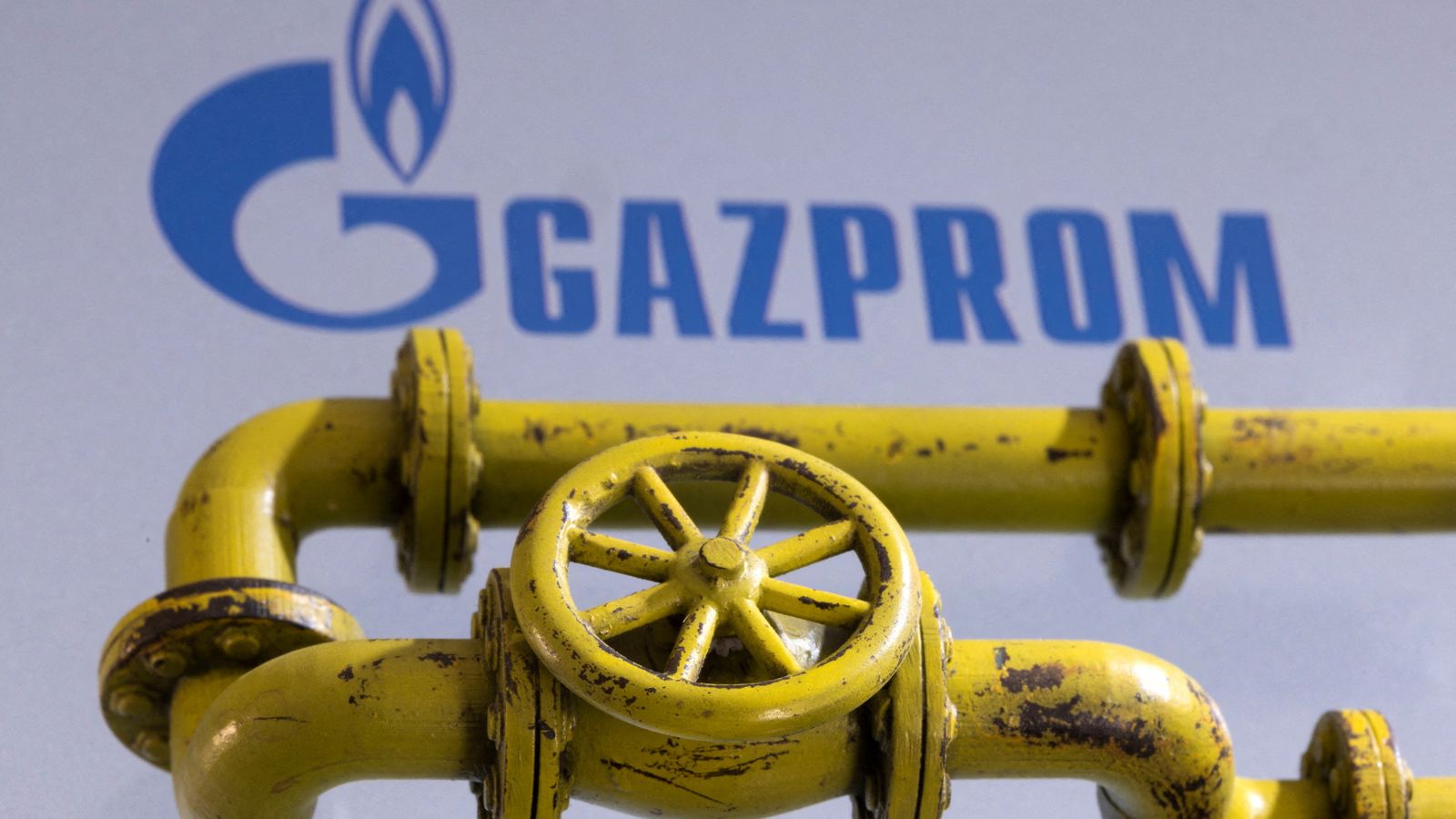The government is preparing to nationalise Gazprom’s British supply arm within days amid a stand-off between the Russian state-controlled energy firm and a Wall Street banking giant.
Sky News has learnt that ministers are drawing up plans to take Gazprom Marketing & Trading Retail (GM&T) into public hands if it fails to reassure financial counterparties about the nature of an apparent change of ownership signalled by its parent company last week.
The move to take control of the UK subsidiary, which could cost taxpayers billions of pounds, may happen as soon as this week, according to one industry source.
Please use Chrome browser for a more accessible video player
It would be among the most significant corporate repercussions so far in Britain arising from Russia’s invasion of Ukraine and the sanctions regime subsequently introduced by the government in an attempt to punish Vladimir Putin.
The Gazprom division supplies roughly 30,000 customers, including many NHS hospitals, local authorities, large retailers and industrial users of gas.
In total, it supplies more than 20pc of the gas used by British companies – a growing number of which have been deserting it in recent weeks.
Placing Gazprom Energy into Ofgem’s special administration regime (SAR) would make Gazprom Energy – as the division is known – the second utility to be absorbed by UK taxpayers, following the insolvency late last year of Bulb Energy, the domestic supplier.
Chelsea FC sale: Cleveland Cavaliers-owners join Cubs and Griffin bid team
Revitalised NatWest weighs £3bn for wealth management giant
P&O Ferries: Criminal and civil investigations opened into ferry firm after it sacked 786 employees
Please use Chrome browser for a more accessible video player
The cost to the public purse of maintaining Gazprom Energy’s existing supply contracts was estimated by Bloomberg News last month to be about £4bn.
If accurate, that would make it significantly costlier than Bulb’s collapse.
Bloomberg also reported that Teneo Restructuring was being lined up as special administrator.
If customers’ existing contracts with Gazprom Energy were not honoured, it would force them to source gas at much higher spot prices which have spiked in recent months and in particular since the start of the war in Ukraine.
The potential insolvency of the Gazprom unit comes at a politically sensitive moment for Boris Johnson’s government, which is preparing to launch a range of policies aimed at ensuring the independence of Britain’s energy supply.
Please use Chrome browser for a more accessible video player
Last week, Kwasi Kwarteng, the business secretary, signed off the appointment of former BP UK chief Peter Mather to join his department’s board as Whitehall tightens its focus on energy supply resilience.
A government spokesperson said: “The UK is in no way dependent on Russian gas, which makes up less than 4% of our supply. Our highly diverse sources of gas supply and a diverse electricity mix ensures that households, businesses, and heavy industry get the energy they need.
“We are aware that Gazprom Energy has a large presence in the non-domestic energy retail market.
“Businesses and organisations should exercise their own commercial judgement with regards to energy supply contracts they have in place at the moment.”
One energy industry executive said it was still not certain that Gazprom Energy would need to be taken into public ownership, but said the division’s fate rested on ongoing discussions between the company and Citi, which acts as its clearing bank.
On Friday, Gazprom Group announced that it had “ceased its participation” in the British arm, but without providing details of any new owners.
GM&T posted a statement on its website saying it was “not in a position to comment on the new ownership structure” but that it “remains operationally independent”.
Please use Chrome browser for a more accessible video player
“We source our gas in the European wholesale markets in exactly the same way as other market participants, and since Q1 2021 we have not received gas under long-term contracts with Russia.
“GM&T, given its significant role within both the energy trading and B2B energy retail sectors, fully recognises the material impact we have in regard to the UK and European financial and energy markets, and thereby the economy.
“We are therefore steadfastly committed to mitigating any adverse impacts, working very closely at present with the UK Energy Regulator (‘Ofgem’) and other UK government agencies to manage these risks.”
It said it would comment further “in due course”.
Gazprom has seen its sponsorship deal with European football’s governing body, UEFA, cancelled since the Ukraine invasions, while a number of cabinet ministers, including the health secretary, Sajid Javid, have urged departmental stakeholders to stop using energy supplied by the company.
Citi did not respond to two emails seeking a response on Sunday, while Ofgem declined to comment.






















